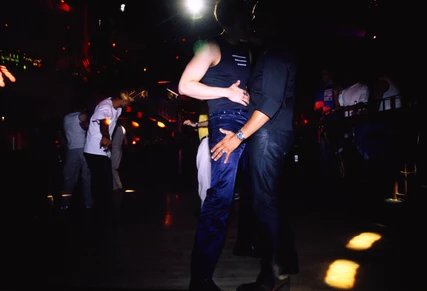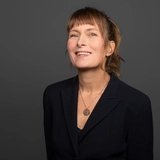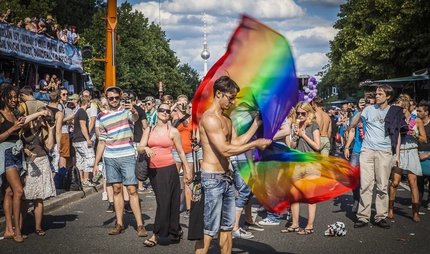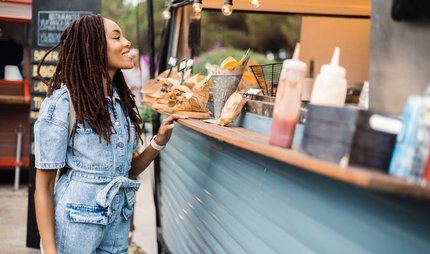
A place of longing, Berlin: the LGBTQ+ scene was already celebrating here in the 1920s. Josephine Baker, Marlene Dietrich and Claire Waldoff make their rendezvous. Magnus Hirschfeld founds his Institute for Sexual Sciences. After the war, the queer scene had to fight for its place in society again - against discrimination, prejudice and the fear of AIDS. A milestone was the first Christopher Street Day in 1979 - and the films by Rosa von Praunheim, which called for self-organisation. Many of today's queer clubs, bars and shops have their roots in the gay and lesbian movement of the 1980s. Today, they are permanent institutions in Berlin. We present 11 of them here.
Tip 1: Discover the Nollendorfkiez with a Berlin drag queen

Back in the 1920s, Berlin's gay and lesbian scene came together in the Nollendorfkiez. Marlene Dietrich and Claire Waldoff enjoy themselves in the bars and cafés, gay couples queue up for the travesty shows at the Eldorado. Christopher Isherwood lived here, the author of Berlin Stories, which served as the basis for the musical Cabaret.
Even today, Germany's oldest queer neighbourhood is still a meeting place for the scene. From Fugger- und Motzstraße to Maaßenstraße and Nollendorfplatz, you will find a wide range of offers for the LGBTQ+ community: bookshops, clubs, bars, restaurants. You can get a good insight into the neighbourhood on the weekly KiezTour. Accompanied by a well-known Berlin drag queen, you can immerse yourself in history and current scene gossip, visit legendary locations, fortify yourselves in quirky bars and also take a look at some of the more wicked shops.
Tip: In summer, the Nollendorf neighbourhood hosts the annual Lesbian-gay city festival
When: Every Thursday from 17.30 pm (by appointment)
Where: Nollendorfkiez (meeting point will be announced after registration)
Tip 2: Enjoy yourselves at SchwuZ

"It's not the homosexual who is perverted, but the situation he lives in." With this film from 1971, gay director and activist Rosa von Praunheim laid the foundations for the gay and lesbian movement in Germany, including the founding of the student initiative HAW (Homosexual Action West Berlin) from which the SchwuZ later emerged. At that time, they fought for the abolition of Paragraph 175, which criminalised physical relations between homosexual men. Today, SchwuZ is Berlin's largest queer club. You can dance and party here all year round. However, there are also regular readings and discussions and, as an association, SchwuZ is committed to legal equality for all queer people.
When: depending on the event
Where: Rollbergstraße 26, Neukölln
Tip 3: Celebrate club history at SO36

Established by the Berlin punk scene in the 1970s and 1980s, SO36 is one of the best-known clubs in Berlin. A few changes of ownership later, Gayhane, the world's first gay and lesbian party series, was established here in the 1990s. Even today, the monthly belly dance beat event attracts the LGBTQ+ scene to the QueerOriental Dancefloor. Traditionally, there is a break about an hour after midnight to address a currently important issue in the scene. The declaration of solidarity is followed by a show interlude with a special guest. The dancing then continues into the morning.
When: depending on the event
Where: Oranienstraße 190, Kreuzberg
Tip 4: Enjoy glamorous laughter at the BKA Theatre

"Pailette geht immer" is the name of the late-night show by Berlin drag queen Jurassica Parka - which has since become the flagship of the night shows at the BKA. Since it was founded in the 1980s, the Berlin cabaret institution has been closely associated with the LGBTQ+ community. And even today you can still see queer artistic figures such as Edith Schröder, the lesbian cabaret artist Sigrid Grajek or plays by Ralf König, who you may know as the illustrator of SchwulComix. He also penned "Der bewegte Mann", which was made into a film in 1994 with Till Schweiger and Katja Riemann. Just take a look at the programme, a visit to this Berlin original, which is hidden in the attic of an old building in Kreuzberg, is always worthwhile!
When: depending on the event
Where: Mehringdamm 34, Kreuzberg
Tip 5: Visit the Tuntenhaus in Kastanienallee

It is Berlin's oldest queer housing project. Since 1990, the residents of the Tuntenhaus in Kastanienalle have loved and lived in colourful diversity - and may continue to do so in the future. In March 2024, the district of Pankow exercised its right of first refusal and purchased the building with financial support from the charitable Edith Maryon Foundation. The foundation is now handing the project over to the residents as a leaseholder. Historically, the house in Prenzlauer Berg is the third housing project that was occupied by homosexuals in Berlin's wild 1980s and 1990s and then renovated by the residents themselves. However, the house in Bülowstraße in Schöneberg, which was squatted from 1981 - 1983, and the Tuntenhaus Forellenhof in Mainzer Straße were evicted. On the ground floor of the Tuntenhaus you will now find two alternative cultural centres, the Schokoladen e.V. and the Club der polnischen Versager.
When: depending on the event
Where: Kastanienallee 86, Prenzlauer Berg
Tip 6: Going out in the Nollendorf neighbourhood
Enjoy a drink at Heile Welt Bar

Who wouldn't want a Heile Welt: In the bar of the same name in Schöneberg's Nollendorf neighbourhood, you can indulge in the illusion for at least one night, sink into the comfy sofas and order your favourite drink from the bartender. It's mainly Berlin's gay scene that meets here, but anyone who feels connected to the queer side of the capital is welcome.
When: daily from 8 pm
Where: Motzstraße 5, Schöneberg
Dress up for a schnitzel meal at Restaurant Elefant

If you want to have a hearty German meal before going out, then we recommend a visit to the Restaurant Elefant in Fuggerstraße. From Hawaiian toast to the 18 schnitzel variations and game goulash, it tastes just like mum's. The restaurant is also a real gem because queer people and gay couples have been served just as politely and courteously as everyone else from the very beginning. Club and fetish outfits are welcome - as long as they are PG. The perfect place to start the night. The Connection Club and the Pussycat are just a few minutes' walk away.
Another highlight on Fuggerstrasse is the annual Folsom Europe Festival.
When: daily 12pm - 11pm
Where: Fuggerstraße 18, Schöneberg
Tip 7: Get advice at Eisenherz Buchladen

Founded in 1978 as a collective out of the new gay movement, Eisenherz is still more than just a bookshop today. The exhibitions and author readings in its own small gallery and event space are an integral part of Berlin's cultural programme. Over the years, Eisenherz has provided many impulses for the gay scene. The Teddy Award, which has been presented at the Berlinale since 1992 for the best queer films - and is considered the world's first official LGBTQ+ film award - is also an idea from the Eisenherz bookshop. You can still find an extensive collection of queer films, novels, comics, specialist literature on gender issues as well as queer children's and young adult literature.
When: Monday to Saturday 10am - 8pm
Where: Motzstraße 23, Schöneberg
Tip 8: Learn more about Magnus Hirschfeld & the sexual sciences

Back in 1919, Magnus Hirschfeld founded the world's first institute for sexual science in Berlin. Under the motto "Through science to justice", the Jewish doctor and sex researcher Magnus Hirschfeld campaigned for the decriminalisation of same-sex relationships and the abolition of § 175, which criminalised homosexuality. Many of his writings fell victim to the book burnings of the National Socialists, but you can see a few of them today in the Gay Museum. The Magnus Hirschfeld Society has also been researching the subject since 1992. You can get a good first insight into the life and work of Hirschfeld in the Exhibition Berlin Global. There, Berlin trans woman Tima the Divine narrates in the role of Hirschfeld's former domestic servant "Dorchen" from that time.
When: Wednesday - Monday 10.30 - 18.30 (Tuesday closed)
Where: Humboldt Forum, Schloßplatz 1, Mitte
Tip 9: See a love scene in the memorial to homosexuals persecuted by National Socialism

An unusual memorial in Tiergarten commemorates the homosexuals persecuted under National Socialism. Through a small square window set into the grey concrete block, you can observe a same-sex love scene. A scene for which people were sentenced to prison and deported to concentration camps during the Third Reich. In concentration camps, gays were then marked with a pink triangle. The memorial plaque at Nollendorfplatz underground station picks up on this symbol. The "Rosa Winkel" is the first memorial to homosexual victims of National Socialism in a public space.
When: around the clock
Where: Ebertstraße, Tiergarten
Tip 10: Get the queer city magazine Siegessäule

For 40 years, Siegessäule has been reporting on queer Berlin. First published on 1 April 1984 as a gay city magazine, Siegessäule is now Germany's biggest queer magazine. On the online platform and in the print magazine you will find current dates, news from the culture & scene, interviews and articles on socio-political topics. You can now find the print magazine at over 500 distribution points in Berlin, in cafés, clubs, bars, advice centres and bookshops - including Eisenherz, of course.
Tip 11: Live your stardom at Monster Ronson's Ichiban Karaoke

The alternative karaoke party bar right by Warschauer Brücke is legendary. Here you can rent one of ten different sized karaoke boxes and belt out your favourite songs to your heart's content. You can reserve the two large boxes, Janis and Elvis, which have space for twelve and 16 singers respectively. If that doesn't work out, you can simply have fun with everyone else in the bar area until one of the smaller boxes becomes available. The brave can perform in front of a large audience at various parties. Hosts are Berlin drag queens. Party flair and disco glamour are guaranteed.
When: daily 6 pm - 4 am
Where: Warschauer Straße 34, Friedrichshain





